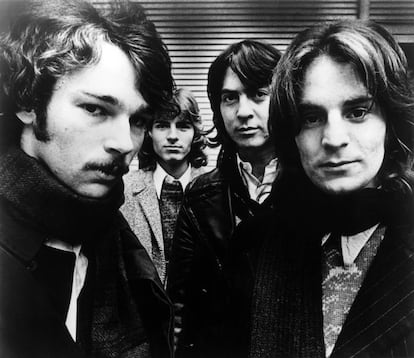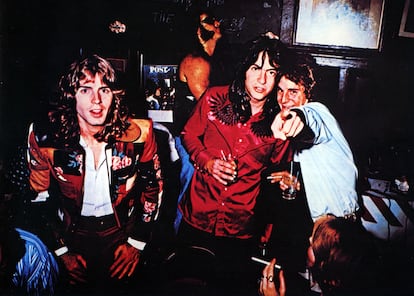So good, but so unlucky: The cult-favorite band Big Star
A series of misfortunes cut short the career of Alex Chilton and Chris Bell’s band, an inspiration for alternative rock. Now, the sole surviving member will tour with a group of admirers, including R.E.M.’s Mike Mills, to play the Memphis band’s repertoire

When Jody Stephens, the only living member of the original Big Star Four, is asked how he would introduce the group to a young person today, he says: “I would ask them to listen to The Ballad of El Goodo and then see if they have any more questions.” The drummer is speaking to EL PAÍS from his home in Memphis, and his response could be superb. Is it? Well, The Ballad Of El Goodo washes over the listener’s emotions even today, 51 years after the song’s release. But there is also an element of pride that immediately comes to the fore when Stephens reflects on the Memphis band. Because it is difficult to find a band so influential and at the same time so beset by bad luck; the latter must be hard to bear for someone who experienced it directly.
Big Star was a cult band par excellence, and it was revered by alternative rock musicians of the 1980s and 1990s. The band’s story highlights how important it is to make everything else work, especially when you have memorable songs. If a rock band is built on high hopes that often go unfulfilled, Big Star provides a case in point. Memphis-native Stephens, 71, is set to tour with a band composed of admirers from R.E.M., Wilco and The Posies (known as The Music of Big Star). In the concerts, they will play the repertoire of Big Star, a beautiful band drowned in a sea of life’s strange vicissitudes.
A raw and beautiful sound
The 1970s were a different time. John Lennon and Paul McCartney had just finished a memorable decade-long artistic partnership. Alex Chilton and Chris Bell, the band’s first members, only lasted for one album. Comparisons with the Liverpool geniuses are not just a rhetorical device. At the age of 16, Chilton had already had a number-one selling album, The Letter, with his band The Box Tops. It is surprising that the husky voice that sang the song came from a beardless teenager. In 1971, Chilton (vocals and guitar), Bell (vocals and guitar), Andy Hummel (bass) and Jody Stephens (drums) formed the Memphis-based band Big Star, an ambitious name that they chose offhandedly: they took it from an American supermarket chain of the same name.

Big Star selected another aspirational name, Number 1 Record, for their first album in 1972. What was so special about them? R.E.M. bassist Mike Mills, who is participating in the tour, tells this newspaper: “I met them through Peter Buck [R.E.M.’s guitarist] and I was thrilled. [The group had] great compositions, wonderfully sung and excellent vocal harmonies.” Guitarist Chris Stamey, who is also on the tour, adds that “Alex and Chris could sing the phone book and make it sound appealing. Also, the band’s attitude was very complete. And the lyrics [were] at times honest, at other times poetic.”
Number 1 Record had a raw, yet beautiful sound. That strange combination was achieved with John Fry’s production assistance. Bell’s compositions sounded glam-rock but with vocal balances reminiscent of Joni Mitchell. The clearest examples of this are Feel and In the Street. Chilton sang as if he were about to collapse. His voice would crack and then, surprisingly, he would catch his breath and come back to life with enough strength to tackle a glorious chorus, as in The Ballad of El Goodo and Thirteen.

Number 1 Record received rave reviews from critics, and DJs began to program the band’s tracks. Big Star seemed to be taking off. But there was bad news. Ardent, the small label with which the group released the album, was taken over by Stax Records, a label with an extensive catalog. The group fell through the cracks of Stax’s glut of artists, and the album never made it to the stores. The group was depressed by a feeling of helplessness. They were the best band of the moment, but they didn’t really exist, because no one could buy the album. Jealousy also exploded between the two band leaders. Bell left a recording session in disgust and drunkenly returned at night to erase the second album tapes. Eventually, Bell — and his demons — left the band.
Chilton, Hummel and Stephens crafted the second album, Radio City, which they released in 1974. Based on his own vision, Chilton put it together and came up with a superb song, September Gurls. However, history repeated itself: once again, the album received great reviews but never made it to the stores. This time Columbia was responsible for distributing the record, but Clive Davis, the group’s champion, was accused of unnecessary spending and fired from the company. Without its patron, the group was orphaned. Stax declared bankruptcy, and Columbia’s distribution was interrupted. This time, Hummel, the bass player, couldn’t handle it, and he went back to school to continue his studies.
After the band’s gradual collapse, only two members remained. For Chilton, it was a dark time that involved heavy drinking and drugs. In the documentary Big Star: Nothing Can Hurt Me (2012), Jon Lightman, the bassist who replaced Hummel, explains the hard times the band was experiencing: “We often played in half-empty halls. Arden, the label, was in chaos, and the future was very dark. We were in a kind of limbo. We would meet to rehearse, and Jody and I would show up on time. Alex would show up five hours later. He’d say, ‘Here I am, I came, but I forgot my guitar.’ That was a typical day.”
Big Star disbanded
Big Star’s third album, Third / Sister Lovers, was recorded in the fall of 1974, and it can be considered Chilton’s solo album. The muse was Lesa Aldridge, Chilton’s girlfriend at the time. It is also a remarkable, if sometimes somber, album that focuses on the ups and downs of the relationship between Chilton and Aldridge. The recording sessions include the Lou Reed track for the Velvet Underground’s Femme Fatale, sung by Aldridge. Following the pattern, the album was a commercial failure when it was released four years later, in 1978, after Big Star had already disbanded.

The series of disasters continued. Since he had left the group, Bell had been stumbling around looking for the path to salvation. He chose drugs, religion, hourly jobs (waiter, administrative work)... He went to London to launch his solo career. He had a recorded album waiting for a contract. It even had a song that reunited him with Chilton, who performed vocals on the beautiful song You and Your Sister. That track was released as a single, along with the lush I’m the Cosmos. But Bell never got to see the full-length album released: he died in a car accident in 1978. He was 27 years old at the time, although few lists of the stars who died at that age include him.
After Big Star’s breakup, Chilton absorbed the punk of the late 1970s. He played in bands like Tav Falco’s Panthers Burns and released charmingly swooning solo albums. In the 1990s, when all hope had been lost, a ray of light finally shone on Big Star. Encouraged by the supportive claims of R.E.M., Teenage Fanclub, Jesus and Mary Chain, The Replacements, Flaming Lips and Cheap Trick (who did a cover of “In The Streets” for the series That ‘70s Show), Chilton and Stephens resurrected Big Star in 1993 with the two leaders of The Posies, Jon Auer and Ken Stringfellow. “In the years I worked with Alex,” Auer says, “I think he was happiest when he wasn’t in front of an audience. He always performed well on stage, but he preferred to play for himself or with friends, out of the spotlight. I had wonderful times playing [with him] in the dressing room before concerts. That was the real Alex.”
That line-up toured with five or six dates every two years and released a new Big Star album, their fourth, In Space (2005). This record made it to the stores, but by now the market was different. It was a good time for Chilton; it was certainly his most stable period financially, and he was most recognized by the industry during that era. But once again darkness lurked around the corner. In 2010, just three days before Big Star was to play at the benchmark alternative music festival, South By Southwest, Chilton died of a heart attack at 59; he had just gotten married. A handful of his musician friends organized quickly to play in tribute to Chilton at South By Southwest. The performers included Mike Mills, Lemonheads, M Ward, Sondre Lerche, and Big Star’s original bassist, Andy Hummel, who would die of cancer just four months later; like Chilton, he was 59 when he passed away.
“Yes, we had serious problems. It wasn’t our time. But that’s changed over time,” Stephens, the drummer, says today. Or to quote the lyrics of The Ballad of the Goodo: “Well, I’ll fall if I don’t fight, and at my side is God/And there ain’t no one going to turn me ‘round/Ain’t no one going to turn me ‘round.”
Sign up for our weekly newsletter to get more English-language news coverage from EL PAÍS USA Edition
Tu suscripción se está usando en otro dispositivo
¿Quieres añadir otro usuario a tu suscripción?
Si continúas leyendo en este dispositivo, no se podrá leer en el otro.
FlechaTu suscripción se está usando en otro dispositivo y solo puedes acceder a EL PAÍS desde un dispositivo a la vez.
Si quieres compartir tu cuenta, cambia tu suscripción a la modalidad Premium, así podrás añadir otro usuario. Cada uno accederá con su propia cuenta de email, lo que os permitirá personalizar vuestra experiencia en EL PAÍS.
¿Tienes una suscripción de empresa? Accede aquí para contratar más cuentas.
En el caso de no saber quién está usando tu cuenta, te recomendamos cambiar tu contraseña aquí.
Si decides continuar compartiendo tu cuenta, este mensaje se mostrará en tu dispositivo y en el de la otra persona que está usando tu cuenta de forma indefinida, afectando a tu experiencia de lectura. Puedes consultar aquí los términos y condiciones de la suscripción digital.









































